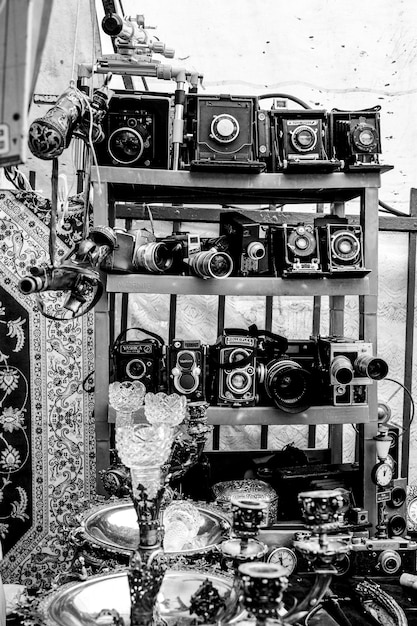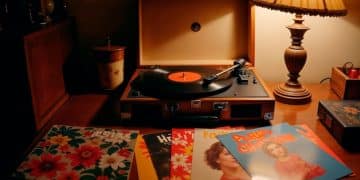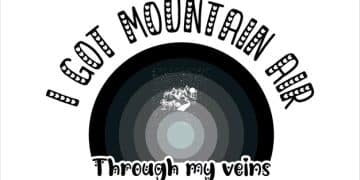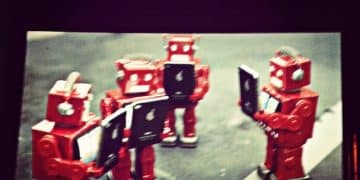The Unsung Composers of Cult Cinema: Rediscovering Forgotten Soundtracks

Unsung composers of cult cinema are the often-overlooked artists behind the iconic soundtracks of forgotten classics, whose innovative and memorable scores significantly shaped the atmosphere and emotional impact of these films.
Dive into the world of cult cinema and discover the unsung composers of cult cinema, the hidden geniuses behind the soundtracks that elevated forgotten classics to iconic status. These are the artists whose music breathed life into the visuals, creating an unforgettable cinematic experience.
Beyond the Blockbusters: The Realm of Cult Cinema
Before diving into the specific composers, it’s important to understand the unique landscape they operate within. Cult cinema exists outside the mainstream, often dismissed by critics upon initial release but finding fervent audiences over time.
These films thrive on originality, pushing boundaries and challenging conventions. This ethos extends to their soundtracks, where composers had the freedom to experiment and innovate.
Defining Cult Cinema
What exactly constitutes a cult film? Is it simply a movie with a devoted following, or is there something more?
- Niche Appeal: Cult films tend to resonate strongly with specific subcultures or groups.
- Unconventional Themes: They frequently explore taboo subjects, unconventional narratives, or experimental styles.
- Enduring Legacy: Despite lacking mainstream success, they often leave a lasting impact on cinema and popular culture.
- Dedicated Fandom: Cult movies inspire intense loyalty and often fuel active fan communities.
This fertile ground allowed composers to create scores that were just as daring and unconventional as the films they accompanied. They weren’t bound by conventional expectations, giving them the room to craft truly unique and unforgettable musical landscapes.

Breaking the Mold: The Pioneers of Sound
Many composers associated with cult cinema deliberately defied traditional scoring techniques. They embraced experimentation, often working with limited budgets and resources, forcing them to be resourceful and imaginative.
Their contributions haven’t always been fully recognized, but their work has indelibly shaped the sound of cult cinema.
Early Innovators
The early years of cult cinema saw composers laying the groundwork for future generations.
- Using Synthesizers: Experimenting with synthesizers and electronic instruments to create otherworldly soundscapes.
- Avant-Garde Techniques: Incorporating unconventional musical structures and dissonant harmonies to unsettle audiences.
- Sound Design Integration: Blurring the lines between music and sound design to create a more immersive sonic experience.
These pioneers laid the foundation for the diverse and often-eccentric soundtracks that define cult cinema.
The Synth Wizards of Sci-Fi and Horror
Science fiction and horror films have always been fertile ground for innovative scoring. Synthesizers revolutionized how these movies sounded, bringing strange new soundscapes to genres known for their creativity.
The following composers used synths to create eerie and fantastic soundscapes, leaving behind music that continues to enthral and disturb.
A Glimpse into Specific Composers
Here are a few examples of composers who pushed the boundaries of synth-based scoring in cult classics:
- John Carpenter: Known for his minimalist and atmospheric synth scores in films like “Escape from New York” and “Halloween,” proving that less can be more.
- Goblin: An Italian progressive rock band that scored numerous Dario Argento films, including “Suspiria” and “Deep Red,” creating intensely disturbing and iconic soundtracks.
- Vangelis: While famous for “Blade Runner,” Vangelis created several other memorable sci-fi scores, showcasing his ability to blend classical and electronic elements.
These composers used synthesizers not just as instruments, but as tools to craft entire sonic environments that perfectly complemented the visuals on screen. They demonstrate the power of synthesizers to enhance storytelling in film.

Beyond Genre: Eclecticism and Experimentation
Cult cinema soundtracks aren’t confined to any specific genre. One of their defining characteristics is a willingness to blend diverse musical styles and approaches.
This eclectic approach often leads to unexpected and memorable results.
Examples of Genre-Bending Soundtracks
Cult films are often characterized by their soundtrack’s eclectic nature. Here a few films that defied genre restrictions, resulting in distinctive auditory experiences.
- “Repo Man” (1984): A punk rock soundtrack that perfectly encapsulated the film’s anarchic spirit.
- “Pink Flamingos” (1972): A deliberately abrasive mix of bubblegum pop and vulgarity that heightened the film’s shock value.
- “Faster, Pussycat! Kill! Kill!” (1965): A combination of surf rock and exploitation cinema that amplified the film’s raw energy.
By embracing eclecticism, those composers crafted soundtracks that were as unique and unpredictable as the films they accompanied. Their fusion of genres developed new and exciting sonic identities.
The Impact on Modern Soundscapes
The influence of these unsung composers of cult cinema extends far beyond their original films. Their innovative approaches have permeated popular culture, shaping the sound of modern music, film, and video games.
Cult cinema’s alternative and experimental nature set the stage for many of the modern soundscapes that define our sonic world.
Their Enduring Influence Today
The impact of these innovative composers resonates in today’s cultural landscape.
- Independent Film: Many indie filmmakers draw inspiration from the DIY aesthetic and unconventional scoring techniques of cult cinema.
- Electronic Music: The pioneering use of synthesizers in cult films paved the way for modern electronic music genres.
- Video Games: Video game soundtracks frequently borrow from the atmospheric and immersive soundscapes developed in cult cinema.
Even now, the avant-garde musical choices made by these composers continue to echo through various forms of entertainment.
Preserving the Legacy of Unsung Scores
It’s crucial to acknowledge and celebrate the contributions of these unsung composers. Their music deserves to be preserved, studied, and appreciated for its artistry and innovation.
By recognizing these composers, we may also provide future generations with the instruments to explore the complex and intriguing world of cult cinema.
Steps Toward Preservation
There are several ways to help preserve the legacy of these overlooked composers and their scores:
- Record Label: Supporting record labels that release expanded or remastered editions of cult film soundtracks.
- Film Archives: Archiving and studying these soundscapes in film study programs.
- Online Communities: Participating in discussions and sharing information about these composers and their work through specialized online communities.
| Key Point | Brief Description |
|---|---|
| 🎶 Cult Cinema Definition | Movies outside the mainstream with unconventional themes and dedicated fans. |
| 🎼 Synth Innovators | Composers using synthesizers to create eerie and futuristic soundscapes. |
| 🎸 Genre Blending | Eclectic soundtracks mixing diverse musical styles and unconventional techniques. |
| 💿 Legacy Impact | Influence on indie films, electronic music, and video game soundtracks. |
FAQ
▼
Cult film soundtracks often feature experimental and unconventional music that reflects the film’s unique themes. They blend genres, use synthesizers heavily, and prioritize atmosphere over conventional melodies.
▼
They often work on low-budget productions, overshadowed by the directors or actors. Their avant-garde approaches may not appeal to mainstream audiences, leading to lack of recognition.
▼
Synthesizers allowed composers to create eerie, futuristic, and otherworldly soundscapes. These new sounds helped establish the identity of the sci-fi and horror genres on-screen, creating distinctive auditory experiences.
▼
John Carpenter, known for his minimalist synth scores, Goblin, scoring many Dario Argento films with intensely disturbing music, Vangelis, famous for his amazing ability to blend and combine classical and electronic elements.
▼
Cult film composers have had an impact on various genres, from mainstream films to video games. Supporting the preservation of their legacy enables future generations to respect their art.
Conclusion
The unsung composers of cult cinema have indelibly shaped the soundscapes of forgotten classics. Their innovation inspired numerous artists and continues to resonate today. By looking closely at these unrecognized artists, we can gain a deeper appreciation of the distinctive sound and enduring creativity of cult cinema.





